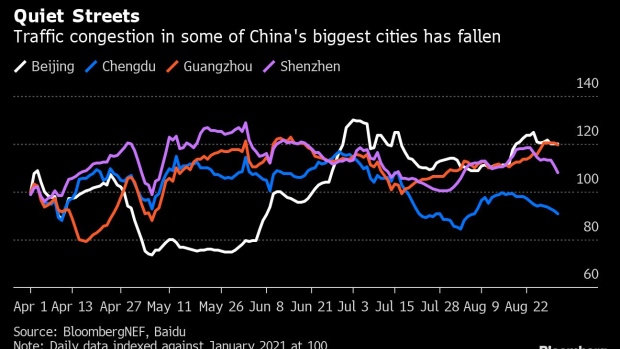Sep 6, 2022
Covid Zero Throttles China’s Oil Demand Ahead of Key Congress
, Bloomberg News

(Bloomberg) -- China’s oil markets are bracing for a rocky few weeks as the government enforces some of the strictest curbs on its citizens since the pandemic began.
As many as 65 million people across the country are now subject to restrictions on their mobility. Events from an annual financial forum in Shanghai to Asia’s biggest pet fair in Shenzhen have been postponed or canceled. Every lockdown of a home or place of work, disrupted holiday or delayed business trip means a lower requirement for fuel. In short, the longer China persists with its Covid Zero policy, the less oil it needs.
And China is nothing if not persistent when it comes to the virus, as shown by its continued willingness to shut down mega-cities like Chengdu, and the tightening of restrictions around Beijing as the capital gears up for a pivotal legislative meeting. The government is doggedly pursuing its policy of eliminating the virus ahead of the party congress that begins on Oct. 16, where President Xi Jinping, the chief proponent of Covid Zero, is expected to secure a precedent-breaking third term in power.
The next two months are usually a busy period for travel due to two national festivals. But the recent virus flareups have dimmed the outlook for transport fuels, said Fenglei Shi, a Beijing-based director covering Chinese oil markets at S&P Global Commodity Insights.
“We expect that gasoline, diesel, and jet fuel demand over September and October will continue to fall short of pre-Covid levels,” said Shi.
Traffic congestion in Chinese cities dropped at the end of August, while the number of trucks on its highways, which typically run on diesel, had fallen to 6.4 million on Sept. 4 versus 7.3 million a month before, according to the transport ministry. The number of daily flights, meanwhile, plunged 41% in the week through Aug. 28 compared with the same period in 2019 before the pandemic struck, according to China Aviation Daily.
While other major economies are learning to live with the virus, China is doubling down on the rules that Xi has declared as the most economic and effective policy for the nation over the long haul. But for millions, including Shanghai-based business consultant Oscar Wang, that means disrupted travel, postponed trips and money unspent.
In the middle of August, a pop-up window appeared on his phone’s health app that warned, according to data tracking, he may have come into contact with the virus. He was forced to cancel a trip to Beijing to see his relatives because, without a clean health code, he wouldn’t have been able to buy train tickets, commute on the subway, enter malls or dine out.
“I am not too sure why I was warned not to travel,” he said. “Perhaps it was because there was a case discovered in my district recently, but that was far from my compound.” Wang’s district in Shanghai is home to over 2 million people and reported a single infection outside quarantine in late July.
Global Repercussions
Add up all the inconveniences inflicted on citizens like Wang and the repercussions are global. China is the world’s largest oil importer, and its second biggest consumer after the US. Transport fuel accounts for about half of China’s total, so any dent to demand will quickly ripple through international markets already grappling with fears that the global economy is barreling toward a recession.
Consumption of fuels like diesel could still get a seasonal boost from their usage in industry and agriculture, while government stimulus may also help juice demand, according to industry consultant OilChem. But there’s still ground to be made up. Even before the latest outbreaks, China’s annual crude imports were tracking for a second successive decline as refiners cut back on purchases because of the threat of virus-related shutdowns. Prior to 2021, China’s imports hadn’t fallen since at least 2005.
So, will the confirmation of Xi’s third-term herald a relaxation of the policies that are throttling oil demand?
“I think it’s more complicated than that,” said Michal Meidan, director of the China Energy Research Programme at the Oxford Institute for Energy Studies in the UK. “It will be hard to walk back quickly a policy that has been closely associated with China’s governance system.”
Meidan said it’s difficult to foresee an immediate revival in oil consumption after the congress. “Overall, I think we will see a recovery in Q4 and heading into year-end, but it’s unlikely to be a linear trajectory or a rapid bounce back,” she said.
In the meantime, residents like Wang are wrestling with deep uncertainty over travel that’s sent a chill through their planning, compounded by the need to navigate China’s Covid bureaucracy. After an appeal to a Beijing hot-line, Wang said he managed to get his health code restored to normal after two days -- and he’s willing to try and make the trip to the capital again in coming weeks.
“But to be honest, I still don’t know why I got the pop-up window,” he said.
©2022 Bloomberg L.P.







